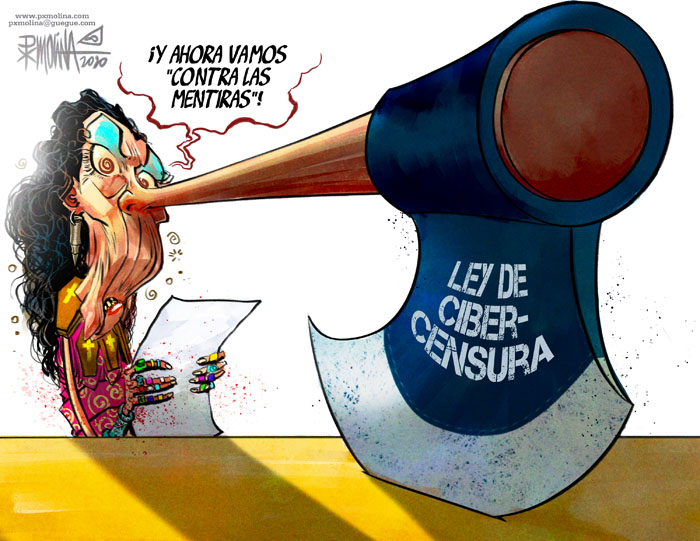2 de octubre 2020

European Concern over Lack of Academic Freedom in Nicaragua

PUBLICIDAD 1M
PUBLICIDAD 4D
PUBLICIDAD 5D
The change in the regime's criminal policy is more a reflection of its fears and weaknesses, than its repressive spirit

Todo lo represivo de este régimen se hace con acciones combinadas con esas fuerzas
A simple analysis of the criminal policy of the Ortega-Murillo regime in Nicaragua, in the last month, gives us an idea of the fragility and despair it faces. On the one hand, it offers prison and confiscation to human rights defenders who are not accountable to the regime for the use of funds coming from international cooperation agencies. It also institutes the establishment of life imprisonment for hate crimes in a country plagued by femicides. And it puts forth a bill that penalizes the dissemination of false information on social networks.
On the other hand, the Minister of the Interior says it released more than 22,500 prisoners in recent months, a number close to the universe of the prison population in the country. The releases take place before the prisoners serve out their stipulated terms. It comes under arbitrary criteria and without any legal basis.
These massive releases do not have any other explanation than the urgency to address the overcrowding of detention facilities. It speaks to the inability of the government to build more prisons or feed an unprecedented number of prisoners. In other words, there are not enough prisons for so many people.
The axiom that the National Police serves to persecute, intimidate, and contain opposition groups instead of ensuring public safety, changed criminal policy in Nicaragua. It puts in check the penitentiary system, which must reserve space for the regime’s political prisoners.
On September 28, the bill called “Special Cybercrime Law” was presented in the National Assembly. It characterizes the crime of “Spreading fake news through information and communication technologies.” Furthermore, it criminalizes: “whoever, uses information and communication technologies, publishes or disseminates false and/or distorted information that causes fear, alarm or anxiety…”
The legal requirement of veracity of publications on social networks is disproportionate and therefore contrary to freedom of expression according to international human rights standards established on the matter. The OAS Declaration of Principles on Freedom of Expression establishes some guidelines that could direct the debate. Firstly, freedom of expression encompasses the issuance of opinions. Therefore, in public debate it is impossible to disassociate facts from a value judgement. The requirement of truthfulness would nullify the public debate.
Secondly, the demand for truth as a requirement for its publication is a contradiction in itself. Debate and exchange of ideas is the appropriate method to seek the truth in democratic and pluralistic societies. That is, to demand truth, denies the search for it. Instead, it promotes self-censorship and stifles the free circulation of ideas and opinions, the main objective of freedom of expression.
The enormous flow of false information that circulates on social networks cannot be denied. However, from my personal assessment it has significant usefulness. First, it makes us users of social networks be more responsible. When we realize we shared false information, it is most likely that we will be more cautious in future publications. Second, it helps us as a society to distinguish between boastful talkers and serious and objective opinions. And finally, it endorses trust in the media, as they are valued as reliable sources before sharing a news item.
If this law promoted by the Ortega-Murillo regime establishes something like: “whoever, knowing that the information is false, publishes it in order to cause harm…,” we would be in the presence of a criminal penalty called “Actual Malice.” A category devoid of protection by freedom of expression, since its main objective is to cause harm.
In any case, what the regime seeks with this measure is to have greater repression tools. At the same time, promote self-censorship on social networks by opposition groups or individuals. However, the real threat faced by journalists, media and opposition leaders, is the criminal category established to penalize “causing alarm, fear or anxiety in the population or in a group or sector…”
All of the above leads me to conclude that the regime’s strength is inversely proportional to our fear as society. If 20 or 200 civil society organizations refuse to register as foreign agents with the Ministry of the Interior, the regime cannot (due to the political cost and the lack of space) imprison them all. How many police officers would it need to protect all the buildings it would have to occupy? If the police agents protect occupied property, who will ensure that people do not protest in the streets?
Undoubtedly, the regime’s shift in criminal policy is more a reflection of its fears and weaknesses than its repressive intent.
Archivado como:
PUBLICIDAD 3M
Abogado nicaragüense, máster y consultor independiente en Derechos Humanos, radicado en México.
PUBLICIDAD 3D